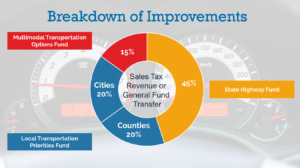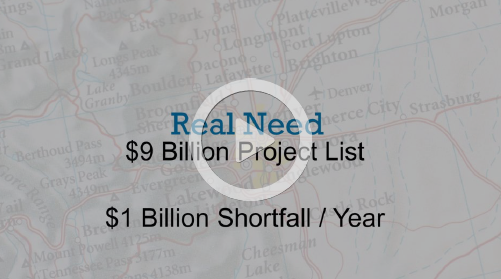
Let’s Go, Colorado!
Coloradans are trying to pump the brakes on the challenges of our transportation system – crumbling roads and bridges that are leading to more time in traffic, more damage to our vehicles and more risk to the safety of those on the road.
In November, voters will consider two ballot items on transportation. The Chamber has joined business and civic leaders in support of a solution that will invest in our transportation system across the state through a small sales tax increase: Proposition 110.
“The time to act is now,” said Tony Milo, who is co-chairing the pro-Proposition 110 coalition, Let’s Go, Colorado! and is executive director of the Colorado Contractors Association. “We have put off addressing this crisis for too long; we must make a change, or we’ll impact our quality of life and our economic future for decades to come.”
The Challenge: Stuck in 1991
Twenty-seven years ago, the Cold War came to an formal end. The Hubble Telescope and its promise of space discovery were launched. Locally, Wellington Webb took office as Denver’s first African American mayor and the first portion of E-470 opened. Much has changed, but one thing that has not is Colorado’s gas tax, last increased in 1991. Meanwhile, vehicles have become more fuel efficient or electrified, limiting the tax’s impact.
In 1991, Colorado spent more than $125 per driver; today, we only spend about $69 per driver. And, the Colorado Department of Transportation has a shortfall of about $1 billion each year. Competitor states like Utah have meanwhile continued to make investments.
As a civil engineer and as mayor of Lone Tree, Jackie Millet knows those numbers don’t add up for safe, efficient roadways or for a strong economic development strategy for the region.
“Proposition 110 is the only measure on this year’s ballot that can fund the transportation safety, capacity and mobility improvements that our citizens and businesses are demanding,” Millet said. “Plus, it empowers local communities to tackle our toughest transportation challenges.”
The Solution: Six Cents on Every $10
The Chamber is part of a statewide coalition that is proposing a .62 percent state sales tax increase. Proposition 110 will raise $767 million per year and will unlock bonding capacity of $6 billion. Here’s where those funds go:
- 45 percent would go to the State Highway Fund to address its priority projects across the state
- 40 percent would go to city and county projects – that’s important because 88 percent of lane miles in Colorado are managed by municipalities
- 15 percent would go to regional transportation solutions
 “This measure will get Coloradans moving across the state,” said Colorado Association of Transit Agencies Executive Director Ann Rajewski. “And, it allows for regions like eastern Colorado to collaborate and find innovative solutions to area-specific needs, like better bus service for seniors.”
“This measure will get Coloradans moving across the state,” said Colorado Association of Transit Agencies Executive Director Ann Rajewski. “And, it allows for regions like eastern Colorado to collaborate and find innovative solutions to area-specific needs, like better bus service for seniors.”
Why Sales Tax?
Sales tax provides less of a burden on residents because unlike property tax, vehicle registration or income tax, our 40 million out-of-state visitors will help pay for our roads too.
“This shows the collaborative nature of Colorado, and it means that residents of the Denver metro area are willing to share some of their economic success and growth with parts of Colorado that have not been part of the same recovery since the Great Recession,” said Christian Reece, executive director of the Western Slope-focused Club 20.
This is the only approach that guarantees the money will be spent on transportation – the legislature cannot use this money for anything else.
And, the Chamber believes this is truly a statewide approach. Although 59 percent of sales tax will be collected in the Denver metro area, it will only see about 41 percent of those funds so that rural parts of Colorado can benefit. While this approach helps rural Colorado, it is also in the self-interest of the Front Range. “The workforce in Colorado is one of the smartest and healthiest in the nation, and they choose to be here because of the quality of life Colorado offers – but they need a transportation system that ensures they can experience that quality of life,” said Chamber President and CEO Kelly Brough.
“When we make this investment in our future together, we don’t create an insurmountable burden for businesses or families, said Cathy Schull, executive director of Pro15, an advocacy group for 15 counties spanning northeastern Colorado. “To the contrary, this small sales tax increase will create more revenue that will make a greater dent in our transportation system needs.”
Investments Pay Off
Proposition 110 will create new revenue to pay for the debt that will be taken on to make these improvements – something business leaders say is a critical responsibility to undertake for their support. Proposition 109 does not – leaving the state on the hook for debt with no new revenue stream.
“Just as a bank wouldn’t approve a mortgage for someone who doesn’t have regular income to pay off that debt, Colorado voters should not approve any investments in our transportation system that don’t create new revenue,” said Ron Tilton, President of FirstBank.
But, business leaders agree that the investment will pay off in the long-term, particularly as Colorado continues to compete for companies and talented workers across the country and the globe.
“Quality of life is a crucial part of the decisionmaking process for workers or employers who are considering Colorado,” said Ted Leighty, CEO of the Colorado Association of Homebuilders and former chair of Chamber statewide policy affiliate, the Colorado Competitive Council. “Proposition 110 will protect and improve our quality of life for Coloradans now and into the future.”
With multiple ballot items on transportation, it can get confusing. We’re clearing up the differences between Proposition 110, which the Chamber is supporting, and Proposition 109, which the Chamber is opposing.
We support Proposition 110 because:
- It’s a small increase that goes a long way in every corner of our state, raising $767 million and unlocking $6 billion in bonding capacity.
- It allows local governments to prioritize projects that impact their communities. In fact, 40 percent goes right to cities and counties.
- The money is dedicated to transportation alone and nothing else. You can even see which projects are included at letsgocolorado.com.
- It ensures that the 40 million out-of-state visitors who use our roads annually pay their share. We think it’s only fair that tourists pitch in to improve our roads too.
Get the facts about transportation:
Sara Crocker is the communications manager for the Denver Metro Chamber.

